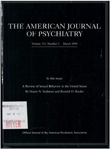Onset of obsessive-compulsive disorder in pregnancy
Abstract
OBJECTIVE: Although the role of pregnancy and childbirth in postpartum psychosis and depression has been studied, the association between pregnancy and obsessive-compulsive disorder has not been specifically addressed. The authors evaluated the role of pregnancy in the onset of obsessive-compulsive disorder. METHOD: Female patients with obsessive- compulsive disorder (N = 106) completed a questionnaire assessing age at onset of symptoms, marital status, number of children, age at each pregnancy, and life events associated with the onset of obsessive- compulsive disorder. RESULTS: Of the 106 women, 42 were childless and 59 had at least one child each; five others were also childless but had had abortions (N = 4) or a miscarriage (N = 1). Of the 42 women without children, 12 (28.6%) had first experienced obsessive-compulsive symptoms between the ages of 13 and 15 years, but there were two peaks of onset for the women with children: ages 22-24 and 29-32 years. Of the 59 patients with children, 23 (39.0%) had experienced symptom onset during pregnancy; this was the first pregnancy for 12, the second pregnancy for eight, and the third pregnancy for three. Four of the five women who had had abortions or a miscarriage had experienced the onset or an exacerbation of obsessive-compulsive symptoms during pregnancy. CONCLUSIONS: The association between pregnancy and the onset of obsessive-compulsive symptoms in these female patients highlights the need for further research on psychological and biological factors associated with pregnancy and obsessive-compulsive disorder.
Access content
To read the fulltext, please use one of the options below to sign in or purchase access.- Personal login
- Institutional Login
- Sign in via OpenAthens
- Register for access
-
Please login/register if you wish to pair your device and check access availability.
Not a subscriber?
PsychiatryOnline subscription options offer access to the DSM-5 library, books, journals, CME, and patient resources. This all-in-one virtual library provides psychiatrists and mental health professionals with key resources for diagnosis, treatment, research, and professional development.
Need more help? PsychiatryOnline Customer Service may be reached by emailing [email protected] or by calling 800-368-5777 (in the U.S.) or 703-907-7322 (outside the U.S.).



